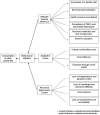A qualitative study of young peoples' thoughts and attitudes to follow a more plant-based diet
- PMID: 37727744
- PMCID: PMC10506079
- DOI: 10.3389/fpsyg.2023.1196142
A qualitative study of young peoples' thoughts and attitudes to follow a more plant-based diet
Abstract
Plant-based diets (PBDs) refer to dietary habits that reduce the consumption of animal-based products and increase the consumption of nutritionally rich plant foods. PBD's have been shown to provide significant health benefits, such as reducing obesity and improving psychological wellbeing, and are environmentally friendly. However, few studies have investigated factors that influence young people's thoughts and attitudes toward following a PBD in western societies, particularly in the United Kingdom. Understanding these factors may benefit public health interventions that encourage the consumption of more fruit and vegetables. The aim of this study was to explore the factors that affect young people's intentions toward following a PBD. Twenty-one young people (18-24 years) participated in this qualitative study. Participants were asked about their views of PBDs in a semi-structured interview. Thematic analysis was utilized to explore views and the barriers and facilitators to following a PBD. The Theory of Planned Behavior (TPB) was used as a framework to organise the findings. Within attitudes, the sub-themes identified were an awareness of a healthy diet, environmental concerns, health concerns and distrust, perceptions of PBDs and associated stereotypes, perceived restriction and lack of enjoyment, and need for education. Within subjective norms, the sub-themes identified were cultural and familial norms, peer influence, and exposure through social media. Within perceived behavioral control (PBC), the sub-themes identified were a lack of independence and parental control, lack of knowledge and perceived difficulty, lack of inclusiveness and accessibility, and inconvenience. Overall, the findings suggest that increased provision of education and knowledge about PBDs to young people, and widening access to PBDs, could encourage and help improve their understanding and intention to follow this dietary style. Tailored health promotion strategies, which also consider additional barriers and facilitators found within this study, could motivate young people to consume a more PBD.
Keywords: attitudes; education; intentions; plant-based diets; qualitative; theory of planned behavior; young people.
Copyright © 2023 McInnes, Carstairs and Cecil.
Conflict of interest statement
The authors declare that the research was conducted in the absence of any commercial or financial relationships that could be construed as a potential conflict of interest.
Figures
Similar articles
-
A qualitative study to explore and identify reasons for dairy consumption and non-consumption among young adults (18-30 years old) in the UK and France.J Nutr Sci. 2024 Dec 6;13:e90. doi: 10.1017/jns.2024.78. eCollection 2024. J Nutr Sci. 2024. PMID: 39703898 Free PMC article.
-
Barriers to Adopting a Plant-Based Diet in High-Income Countries: A Systematic Review.Nutrients. 2024 Mar 14;16(6):823. doi: 10.3390/nu16060823. Nutrients. 2024. PMID: 38542734 Free PMC article.
-
Social distancing intentions to reduce the spread of COVID-19: The extended theory of planned behavior.BMC Public Health. 2021 Oct 11;21(1):1836. doi: 10.1186/s12889-021-11884-5. BMC Public Health. 2021. PMID: 34635071 Free PMC article.
-
Beyond the black stump: rapid reviews of health research issues affecting regional, rural and remote Australia.Med J Aust. 2020 Dec;213 Suppl 11:S3-S32.e1. doi: 10.5694/mja2.50881. Med J Aust. 2020. PMID: 33314144
-
A Comprehensive Review of the Literature Supporting Recommendations From the Canadian Diabetes Association for the Use of a Plant-Based Diet for Management of Type 2 Diabetes.Can J Diabetes. 2016 Oct;40(5):471-477. doi: 10.1016/j.jcjd.2016.02.011. Epub 2016 Jul 28. Can J Diabetes. 2016. PMID: 27476051 Review.
Cited by
-
Perceptions on changes towards plant-based diets for health and environmental benefits: a cross-sectional study.BMJ Nutr Prev Health. 2025 Jun 13;8(1):e001191. doi: 10.1136/bmjnph-2025-001191. eCollection 2025. BMJ Nutr Prev Health. 2025. PMID: 40771491 Free PMC article.
-
Depression, Anxiety, Emotional Eating, and Body Mass Index among Self-Reported Vegetarians and Non-Vegetarians: A Cross-Sectional Study in Peruvian Adults.Nutrients. 2024 May 29;16(11):1663. doi: 10.3390/nu16111663. Nutrients. 2024. PMID: 38892596 Free PMC article.
-
Using the theory of planned behaviour to understand the adoption of vegetarianism among females in Saudi Arabia.Front Public Health. 2025 May 14;13:1566712. doi: 10.3389/fpubh.2025.1566712. eCollection 2025. Front Public Health. 2025. PMID: 40438068 Free PMC article.
-
'Let's talk about sleep health' within primary care: a qualitative study of patients' willingness to engage in psychological interventions for insomnia.Br J Gen Pract. 2024 Jul 25;74(745):e560-e569. doi: 10.3399/BJGP.2023.0310. Print 2024 Aug. Br J Gen Pract. 2024. PMID: 39054078 Free PMC article.
-
Understanding online purchase intention of plant-based foods: Exploring causal factors and moderating role of self-efficacy within the SOR theory.Heliyon. 2024 May 7;10(10):e30785. doi: 10.1016/j.heliyon.2024.e30785. eCollection 2024 May 30. Heliyon. 2024. PMID: 38765028 Free PMC article.
References
-
- Ajzen I. (1985). “From intentions to actions: a theory of planned behavior” in Action control. SSSP springer series in social psychology. eds. Kuhl J., Beckmann J. (Berlin, Heidelberg: Springer; ), 11–39.
-
- Bearman M. (2019). Focus on methodology: eliciting rich data: a practical approach to writing semi-structured interview schedules. Focus Health Prof. Educ. 20, 1–11. doi: 10.11157/fohpe.v20i3.387 - DOI
LinkOut - more resources
Full Text Sources


